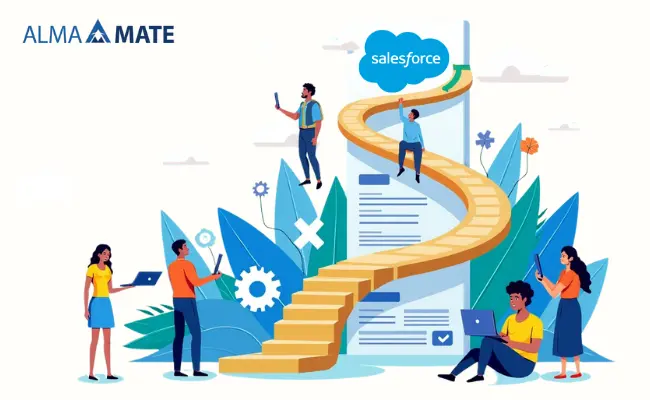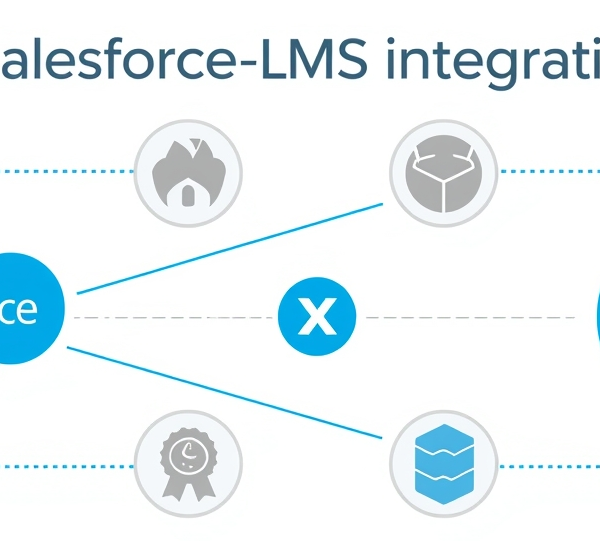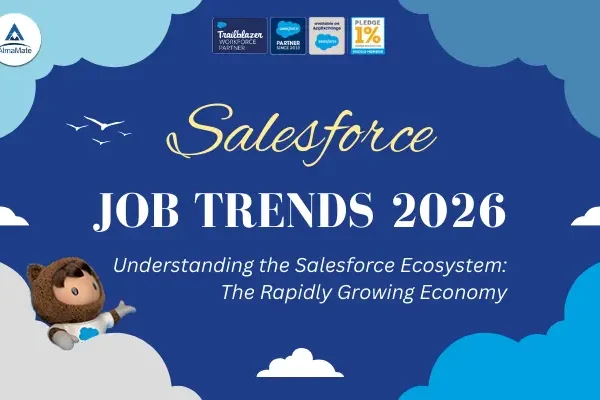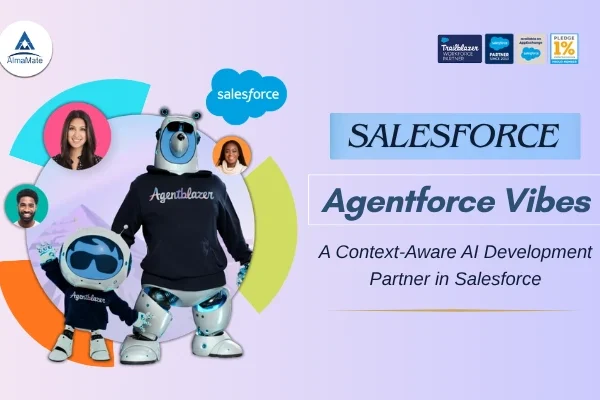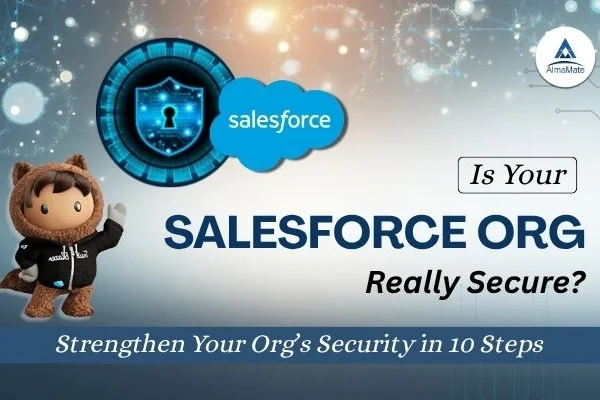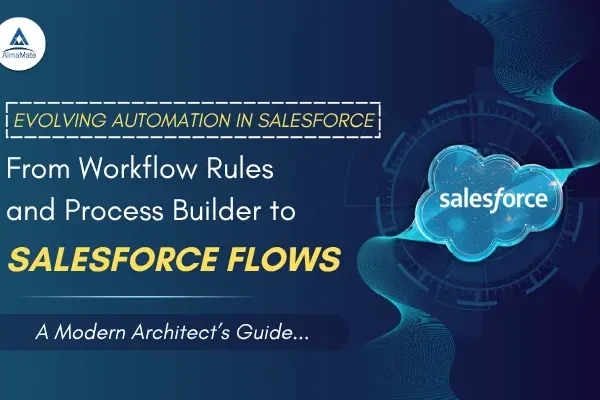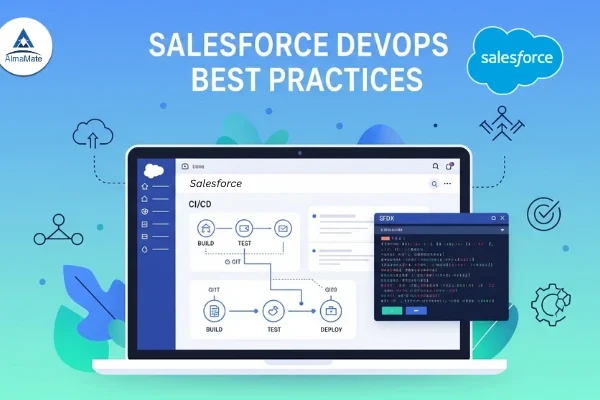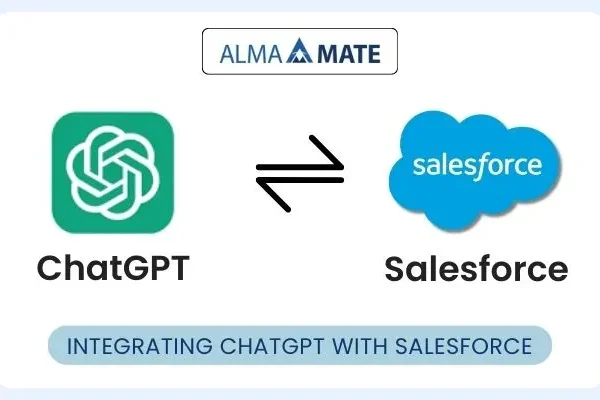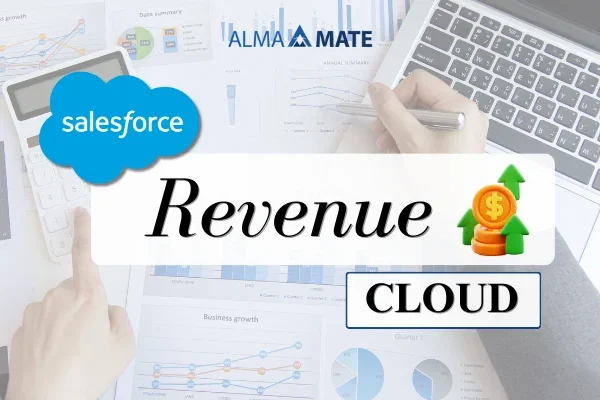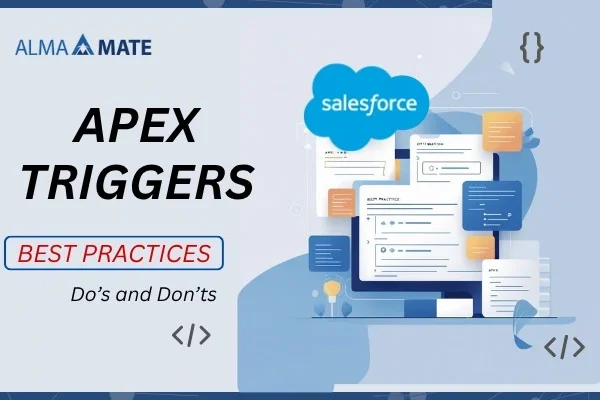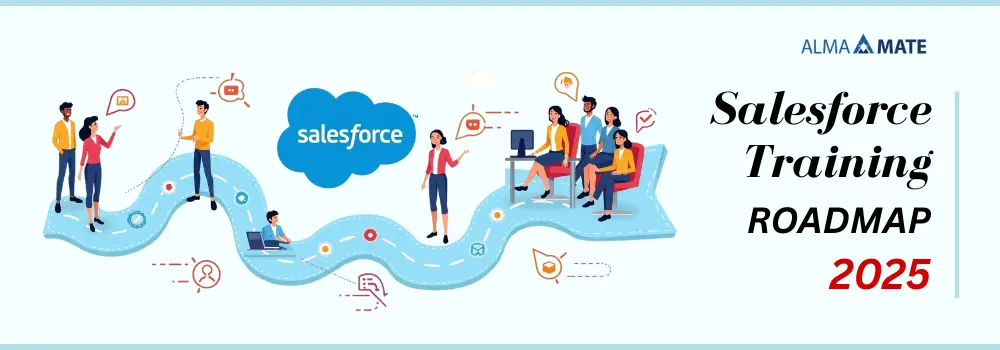
Table of Contents
Introduction
Alright, let’s cut through the usual corporate fluff. These days, every company is scrambling to keep customers happy, and honestly, Salesforce is present everywhere. It’s not just some boring old CRM anymore—it’s like the Swiss Army knife of business software. There’s a tool for everything, and half the time, the new learners don’t know what the tools do until someone explains their functionality to them. That’s when/where this Salesforce Training Roadmap comes to the fore.
So, if you’re reading this article, you probably know what Salesforce is (or at least, you’ve heard some manager rant about it, which may well be the reason behind you perusing this Salesforce Training Roadmap!). Maybe you’ve even logged in, poked around, and immediately backed out because the tabs and dashboards look like spaceship controls. I have seen so many folks get stuck and overwhelmed by all the learning options (seriously, there are thousands), while others just plateau at “basic admin” and wonder why they’re not raking in the big bucks as specialists. This Salesforce Training Roadmap shall address these challenges.
This Salesforce training roadmap is not just a boring checklist—it’s more like a path to get from “what is this?” to “oh, I know what I’m doing.” Whether you want to be an admin, a dev, a consultant, or the mythical solution architect, this Salesforce Training Roadmap has got you covered. Expect real talk, practical tips, and the kind of hard-won advice people usually gatekeep until you’ve experienced your first Salesforce meltdown.
Why Salesforce Skills Are in Demand?
Because data now rules the world, and Salesforce is the kingpin of data. Over 150,000 companies use it—from scrappy startups to the Fortune 500 old guard. And the platform never sits still—every time you blink, there’s some shiny new AI feature or automation tool or update dropped (three big releases a year, no joke). If you know your way around Salesforce, you’ll always have options. Want a new job? Freelance gigs? Promotion? Refining Salesforce skills is your golden ticket to achieving these. Here’s what makes the Salesforce Training Roadmap and the right Salesforce training so valuable:
- High adoption rate across industries: From finance to healthcare, retail to manufacturing, this Salesforce Training Roadmap shall come in handy in many ways.
- Constant innovation: Salesforce releases three major updates every year.
- Versatility of roles: Admins, developers, consultants, analysts, marketers — all can specialize within the ecosystem by following this Salesforce Training Roadmap.
Who is this Salesforce Training Roadmap meant for?
Pretty much anyone who’s curious about Salesforce can follow this Salesforce Training Roadmap:
- Folks switching to tech & Salesforce training from the teaching, retail, or other non-IT sectors.
- Developers seeking to specialize and capitalize on opportunities.
- Admins who want to level up beyond resetting passwords by following this Salesforce training roadmap.
- Students and graduates who want to pursue a Salesforce training program or follow a Salesforce Training Roadmap to jump into cloud careers.
If you can stick with it and use what you learn from this Salesforce Training Roadmap, you can carve out a career path in the Salesforce ecosystem.
Understanding the Salesforce Ecosystem
Before you dive deep into the usage of advanced features, you have to zoom out and see the lay of the land. Picture Salesforce as this massive, ever-expanding city. You wouldn’t just wander in without a map, right? At its heart, it’s a cloud CRM: it keeps track of customers, sales, etc. But then you’ve got all these add-on “clouds” for sales, service, marketing & analytics. And AppExchange is like an app store where you can bolt on extra powers, just like you do with your phone.
Getting good at Salesforce isn’t just about memorizing buttons. It’s about understanding how all these pieces slot together to solve real business problems. You want to think like an architect, not just another button clicker.
Alright, here’s the deal—don’t just barrel through those modules of the Salesforce Training Roadmap like you’re collecting gold coins. Slow down, get nosy. Poke at stuff. Think, “Okay, if I actually worked at Acme Corp, how would I use this thing?”
Picture yourself as the sales rep, squinting at that dashboard, or the support person trying to make their life a little less painful with automation. When you start tying these weird little features to actual business problems, suddenly Salesforce isn’t just a giant maze of buttons anymore. It’s more like—oh hey, I know this shortcut! You stop feeling lost, start acting like you own the place, and before you know it, you’re zipping around fixing stuff like a pro.
Your Salesforce Training Roadmap starts: Beginner Level
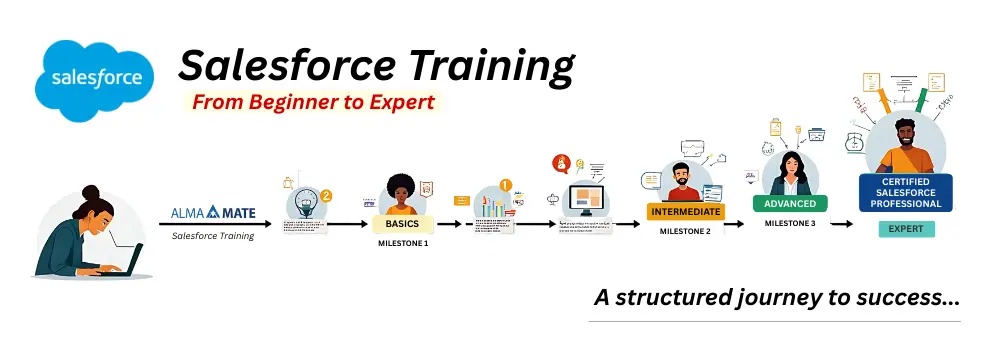
Choosing the Right Learning Path (Admin, Developer, Consultant)
Your first big decision is choosing your starting lane.
- Administrators Tweak settings, customize stuff, but mostly dodge code.
- Developers Build custom features, sling code in Apex, Visualforce, Lightning Web Components—basically, make Salesforce do things it’s not supposed to do out of the box.
- Consultants Be the people-person who figures out what clients need and makes it all work, blending tech and biz know-how.
Guess what? You’re not locked in. Tons of admins end up learning to code, and devs sometimes pivot to consulting. Just pick a lane and get moving—the rest sorts itself out.
Setting Up a Salesforce Developer Org
Think of a Salesforce Developer Org as your experimental zone. It’s totally free and you can try out various features without nuking anything important. Sign up on Salesforce’s website and you’ve instantly got a playground to try and fail while practicing.
Navigating Trailhead & Free Resources
Trailhead’s basically Salesforce’s nerdy amusement park—badges, points, goofy avatars, the whole deal. And it’s actually useful. Mix that with YouTube rabbit holes, random blog posts, and those legendary forum threads where someone inevitably solves your problem in the last comment? Boom, you’re leveling up without dropping a dime.
However, don’t just sit there soaking up info like a sponge—get your hands dirty in your Developer Org right away. Try stuff out. Break things. After every module, toss yourself a mini challenge—maybe whip up a new custom object, or try your hand at building a Flow (yeah, even if it feels intimidating at first). That’s how stuff actually sticks. Oh, and don’t sleep on the Trailblazer Community. Jump in, answer a few random questions, or revise what you just learned. Teaching others is basically a cheat code for locking in new skills and, honestly, it’ll boost your swagger faster than you think.
Essential Skills for Beginners
- Objects & Fields: Think of these as the building blocks—kind of like digital Lego building blocks.
- User Management & Permissions: Seriously, give people access to what they need and keep the snoopers at bay. Otherwise, chaos shall surely ensue.
- Reports & Dashboards: Ditch the endless Excel sheets. This is where the numbers actually start to tell a story. Feels a bit like wizardry.
- Automation Basics: Automate the boring stuff! If you enjoy doing the same thing a thousand times, more power to you. Most of us would rather set up a Flow and let the bots take care of the mundane tasks.
Intermediate Level of Salesforce Training: Building Real-World Skills
Alright, once you’re done clicking around and experimenting with the basics, it’s time to get your hands dirty: Real projects & challenges: real learning.
Mastering Core Salesforce Administration
This is where you fine-tune your skills in automation, security, and data management. You should be able to design processes that improve efficiency without creating unnecessary complexity. Now you’re getting fancy with automation, keeping data safe, and herding all that info like a pro. The trick is to make things work better, not just pile on more buttons. Don’t make it so complicated that even you can’t remember what you built.
Introduction to Apex and Visualforce
Even if you aim to stay on the admin path and pursue a career as an administrator, learning basic Apex can be a career booster. You’ll understand how developers work and can collaborate better. Visualforce is older tech, but still worth knowing for legacy projects. Look, even if you never want to code for a living, knowing a bit of Apex will help you solve a wide gamut of real-world problems.
Understanding Lightning Experience & LWC Basics
Lightning Experience is the modern interface of Salesforce, and Lightning Web Components (LWCs) are the future of its customization. Start with simple LWCs to grasp component-based development. Lightning’s the cool, new interface that Salesforce offers and Lightning Web Components are where all the action is now. Start with simple LWCs to grasp component-based development.
Working on Small Real-Time Projects
At this stage, start building. This is where theory becomes muscle memory. Stop reading and start making. Tack together a lead tracker, a basic inventory system, or even a dinky customer support app. You’ll learn more from one half-broken project than from a dozen tutorials.
Earning Your First Salesforce Certification
Most people go for the Salesforce Administrator or Platform App Builder certifications first. These validate your skills and signal to employers that you’re serious. It tells the world, “Hey, I sorta know what I’m doing.” Employers love it, & your LinkedIn profile gets shinier.
Advanced Level: Becoming a Salesforce Expert
At this stage, you are not just following instructions received from experienced users: you are designing solutions proactively.
Deep Dive into Apex, SOQL & Triggers
Mastering Apex implies understanding how to handle complex business logic, bulk data processing, and integrations. SOQL is your tool for querying Salesforce data, and triggers are where you apply that logic. This is where you wrangle gnarly business logic, crunch data in bulk, and hook Salesforce up to other systems. SOQL is your search engine and triggers are your magic spells.
Advanced Lightning Web Components (LWC)
Learn how to create complex, interactive interfaces that make Salesforce more intuitive for users. Time to make those interfaces do backflips. The goal: build screens so slick that your users and clients actually want to use them.
Salesforce Integrations (APIs, External Systems)
Real businesses rarely run on Salesforce alone as their go-to CRM software. Learn to integrate with payment gateways, ERP systems, marketing tools, and more. Working smoothly while in tandem with other Apps is as important as following a Salesforce Training Roadmap.
Specializing in Niche Areas
The Salesforce universe has niche zones like CPQ (Configure, Price, Quote), Marketing Cloud, Commerce Cloud, and now Einstein AI. Specializing can make you the go-to expert in that area. Pick a Specialty: Want to be the CPQ wizard? Marketing Cloud guru? Einstein AI whisperer? Dive deep. The more niche, the more valuable you get.
Advanced Certifications
Roles like Platform Developer II or Solution Architect. Go after the Big-Name Certifications that require deeper technical mastery. If you’re shooting for roles like Platform Dev II or Solution Architect, these certs are tough — but they put you in another league. These certifications are challenging but position you as a top-tier professional.
Practical Experience & Career Growth
Look, nobody cares if your LinkedIn is stuffed with fancy badges but you’ve never actually solved a real problem. Certifications are cool and all, but if you wanna stand out, show off your projects. Make a Salesforce portfolio that screams, “I do stuff that matters.” Put in screenshots of dashboards that you have built (bonus points if they look slick), brag about the gnarly challenges you crushed, and yeah—drop some public GitHub links so folks can poke around your code.
Jump into open source or community projects if you’re feeling spicy. Hit up Dreamforce or just attend some local user group events—the networking is half the game, trust me.
When it’s interview time, ditch the robotic “I built a dashboard” script. Tell a story. What was wrong before you showed up? How’d you fix it? Did you save the company money, or just keep your coworkers from losing their minds? Focus on these details. Make it memorable.
Tools & Resources for Continuous Learning
- Salesforce Docs: Let this be your official source for accurate information. Don’t go through or refer to sketchy blogs that’ll steer you wrong and provide you with wrong information.
- VS Code + Salesforce Extensions: Don’t even bother working with other stuff.
- Trailhead: Free modular learning platform with hands-on projects and Salesforce training roadmaps.
- Trailblazer Community: Ask questions, network, and get real-world answers
- Focus on Force: Exam guides and practice exams for certifications
- Pluralsight & Udemy: Deep-dive technical courses explained in simple language
- YouTube (SFDC channels): Quick visual demos of features and setups
Common Mistakes to Avoid
- Learning without practice: Reading about Salesforce is not enough; you must build your own projects from scratch.
- Skipping fundamentals: Jumping into advanced features without mastering basics slows you down later on.
- Chasing too many certifications at once: Focus on quality (depth of learning) over quantity (the number of certificates you acquire).
- Just sticking to Trailhead? if that’s your only move, you’re gonna miss a ton. Mix it up! Dive into the docs, mess around with actual projects, hop into forums—get your hands dirty, you know?
- People love to geek out on features but totally skip the “why.” if you don’t know what problem you’re solving, all those shiny tools won’t help. Business context is everything. Otherwise, you’re just building stuff because it’s there. Not smart.
- Being averse to coding: Some folks swear off code like it’s haunted. But if you’re dead-set against touching Apex or SOQL, even as an admin, you’re boxing yourself in. Eventually, you’ll hit a wall. Plus, devs will just roll their eyes at you in meetings.
- Not documenting your stuff: I mean, sure, building is fun, but if you don’t write down what you did and why, it’s a mess later. Future you (or your teammates) will thank you when things break—because, trust me, things always break.
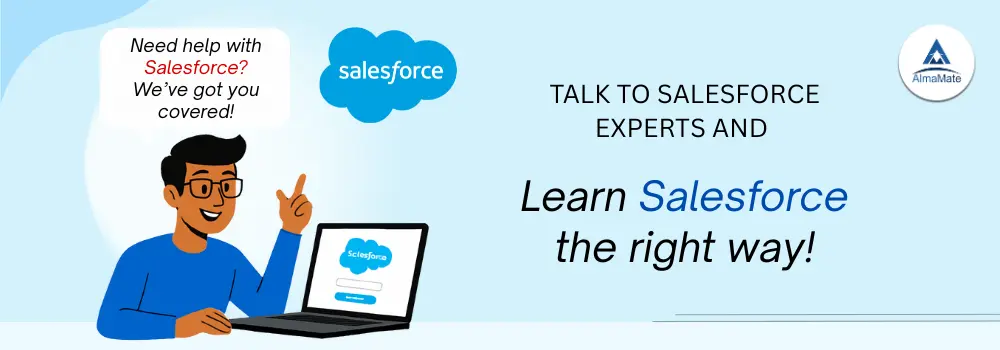
Conclusion: Staying Updated in the Salesforce Ecosystem
The beauty of Salesforce lies in its constant evolution. It never stagnates—each update brings fresh features, smarter automation tools, and more advanced AI capabilities. This presents both a challenge and an opportunity: the challenge is to keep pace, and the opportunity is to remain curious, continue learning, and keep creating. Salesforce changes faster than the latest TikTok trend, with every release introducing new tools and possibilities to explore. Following this Salesforce Training Roadmap shall help greenhorn aspirants with upskilling fast and landing high-remuneration jobs in the Salesforce ecosystem.
If you’re serious about turning this Salesforce Training Roadmap into a real and rewarding career path, then don’t leave your growth to chance. AlmaMate Info Tech, widely regarded as the Best Salesforce Training Company in Noida, offers industry-driven training programs designed specifically for professionals and beginners who want to master Salesforce in a structured, results-oriented way.
Their experienced mentors, updated curriculum, and project-based learning approach ensure that you don’t just collect badges but develop the confidence and practical expertise that top employers look for. Whether your goal is to land your first Salesforce job, transition from another field, or move up into specialist or architect-level roles, AlmaMate will guide you step-by-step. Reach out to AlmaMate today, speak to their knowledgeable team, and start transforming your Salesforce potential into a high-paying, future-proof profession.

